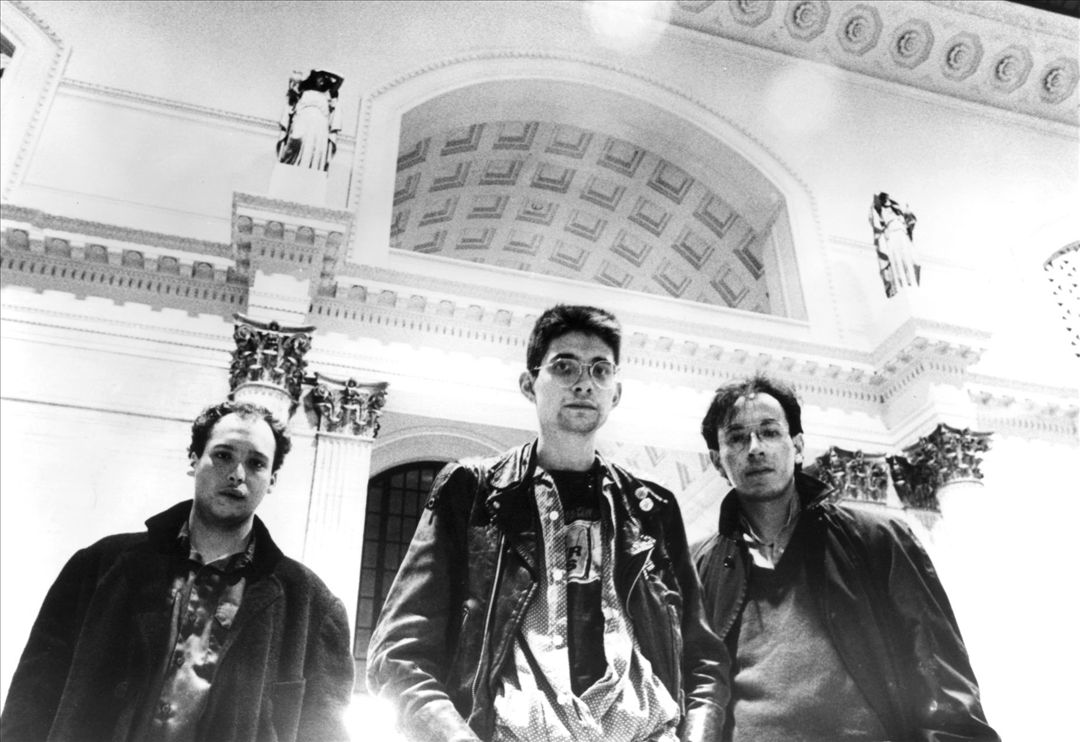It is hard to say what Steve Albini would want to have written about him the day after he died. “Requiescat” was the term he would tend to use on social media whenever he paid tribute to those individuals he’d known or admired who had recently passed away. It’s a fancy word, from Latin. Not one that nowadays remains in many people’s vocabularies. Much like “integrity”, “dignity” or the correct use of “humble”.
For all that can be said about the music Albini made with his own bands, not to mention that which he recorded for other people, and whether or not one agreed with his various wavering contentions over the years, it was always worth listening to what he had to say. He often downplayed this, as outspoken as he often came across. Big Black’s lyrics, Albini always said, came second to the music. The pulverising sound was the most important element. He wanted to hear “big-ass vicious noise” that made his head spin. “I wanna feel it whipping through me like a fucking jolt,” he wrote in one of his zine entries-cum-manifestos. “We’re so dilapidated and crushed by our pathetic existence we need it like a fix.” He achieved this aim with Big Black once he expanded it from a post punk solo project to a full-bore bludgeoning noise-rock band after the recruitment of Santiago Durango and Jeff Pezzati from Naked Raygun. (Later, Dave Riley would replace Pezzati. And lest we forget the crucial contribution of the drum machine, Roland.)
Albini’s lyrics, however, were among the most outstanding of their era. He didn’t sing about lame things like whatever was going on in his personal life. (If the Big Black chapter in Michael Azerrad’s Our Band Could Be Your Life is to be believed, this involved excessive consumption of the Peperami-like American snack known as the Slim Jim). He didn’t adopt the direct political sloganeering of the hardcore punk scene. Instead, Big Black’s lyrics read like engrossing short stories. David Quantick compared them to the works of Raymond Carver. Various unsavoury characters and situations were recounted by Albini in gripping and darkly humorous ways. There was debate, at the time, concerning whether Albini himself was quite as nasty as the characters whose lives he described, inhabited and embellished in his songs. Doing little to counter such accusations were those aforementioned zine entries, the taboo-baiting liner notes he relished composing, and the off-colour jokes he told onstage.
As it turned out, Albini was neither cold hearted sadist nor haughty moralist. He was a satirist and humorist. Above all, he was an empath to the very end. The multilayered verses of Randy Newman or the routines of Lenny Bruce spring to mind.
Now that we can no longer simply ask this honest, open and instantly quotable interviewee, as we could in those golden days that have been suddenly robbed from us, there will be various methods employed to explain who Albini turned out to be, what exactly made him who he was, and what seemed to make him tick. Given that his father Frank was an authority on the science of containing forest fires, this could help to explain some of his more pyromaniac tendencies in the studio, as well as his sharpness when it came to solving problems, be it in terms of the optimum way to mic-up a drum kit, warding underground bands away from the temptations of major labels on an economic basis, or suggesting that anyone who runs for public office should be able to prove that they have, at least once, digested psychedelic drugs.
In Emily Pothast’s cover story on Shellac in this month’s edition of The Wire, Albini put much of his outlook down, as he always did, to his luck at being involved in a particular movement at a specific time in history. The DIY punk/post punk scene in the US formed (or at least solidified) his ideals, ethics, open-mindedness, generosity, cynicism and all the other values that made Albini the man he turned out to be.
There is also something to be said for the fact that his degree, awarded by Northwestern University, was in journalism. Music’s gain was journalism’s loss. For those grisly Big Black lyrics, Albini often cribbed info from real-life stories he’d read in the newspapers. Shellac’s lyrics were a more sophisticated and maturer extension of this creative process. Even here, critics and fanboys alike were prone to overlooking the inherent irony within. (See ‘Prayer To God’, as a case in point, which has been covered acoustically by Frank Turner among other bearded opportunists.) Albini was informed. He was articulate. Boy, could he write.
Unlike most bands, Shellac had the policy of not sending out advance copies of their records to journalists because they didn’t want to award anyone special treatment. Close friends and family members excepted, everybody would be able to access Shellac’s releases at exactly the same time. This was a way to circumvent power structures and avoid tricking or manipulating anyone into purchasing their records. At times, this could make it difficult to write about Shellac, as Pothast discovered when she almost persuaded bassist Bob Weston to play her some of To All Trains down the Zoom call, ahead of its imminent release. In the end, Weston couldn’t be persuaded. “It just sounds like another Shellac record, he offered. “It’s the same three guys in the same studio.” Talk about underselling the greatest self-described “minimalist rock trio” the world has ever produced.
Advance promos aside, Albini had a lot of time not just for journalists but basically anyone besides your standard bigots and other assorted plonkers. He cared about stuff. He was generous. He led by example. As his stance on not accepting royalties for his recording engineering work demonstrated, he was not motivated by the idea of amassing money. Had he wanted to, he could have been a much richer man, but he chose not to be, and not many people would make that decision. He was also a man with a moral compass in an environment populated by unscrupulous characters from Succession. His instinct veered towards collaboration rather than competition. He was a man of principle but also humility and self-deprecation, who was happy to hold his hands up if he thought he’d got something wrong. He responded to the most banal of email enquiries as if he were not one of the most highly regarded recording engineers of all time. He was an absolute joy to interview. “I have to look at myself in the mirror when I shave in the morning,” he once explained to Stewart Lee for The Sunday Times. “I’d rather not look at a coward or someone who was exploiting people.” This quote gets to the heart of who Steve Albini was, why he was so widely admired, and maybe even who we all should aspire to be, in an ideal world.
Before Albini’s death, in the run up Shellac’s new album, several “X” accounts made jokes about its release date being “Christmas for middle-aged white blokes”; a fair point but is it worth asking what might now be lost?
If everything got worse when John Peel died, and if matters demonstratively went to the dogs as soon as Fugazi embarked on their hiatus, then things have really deteriorated now that Steve Albini is no longer with us.
Requiescat.
J.R. Moores

“I hope when I die I go like John, embroiled in the middle of things, surrounded by people I love, doing the things that matter most. I hope I leave a mountain of shit unfinished, a pan on the stove, a phone call waiting and a pencil in my hand. I hope I’m man enough to be thinking about tomorrow.”
Steve Albini said this about his friend, John Grabski, of the band Teeth, who had succumbed to cancer at 33, not letting up for a second while he battled it. Steve marveled at Grabski’s resolve, while working on The Strain, a collection of songs that documented the stress of oncological treatment.
Perhaps Albini got his wish. On 7 May, at only 61 years old, he suffered a heart attack. Reports say he passed in his home, but don’t mention his home was within Chicago’s Electrical Audio, the recording studio he started in 1997. It was booked out for the next few months. There was work to be done. He died in the building that housed the high quality recording gear he had hand-picked over many decades.
Albini hated being called a producer, despite having worked on multiple touchstone recordings. His detractors dragged him for being pedantic, but were rarely curious about why he preferred “engineer.” In many ways he was the antithesis of George Martin or Tony Visconti. While all three shared a goal of sonic excellence, the latter also often functioned as temporary band members, arrangers, and even performers. As Albini saw it, his job was to document a band at a specific point in their career, making the drums in particular sound excellent. He wasn’t there to fix a song’s structure, or boldly suggest phase shifting everything during the song’s bridge. He applied the science and physics of recording in a practical way, leaving the artistic decisions to the artist, even if he was one himself. When the world went fully digital, he leaned heavier on traditional techniques, using outboard gear and tape machines, turning obsolescence into his expertise.
Most of all, he eschewed the idea that anyone but the band deserved points on a record. “I would like to be paid like a plumber: I do the job and you pay me what it’s worth,” he said, adding that plumbers don’t get paid in perpetuity if the toilet continues to work. “Producer points are a form of theft. The ‘little extra’ that trickles in over time should go to the band.” Electrical Audio also appeared to price on a needs-based scale. It’s assumed Maple Stave didn’t pay the same per-hour rate as Nirvana, Jarvis Cocker, or Robert Plant and Jimmy Page.
Albini was misunderstood by people who didn’t understand his MO. Those who interacted with him, though, knew he was the genuine article, endlessly generous with his time, and a present teacher, dedicated to sharing knowledge. Fact is, he just didn’t suffer fools well. Asinine questions, loaded with bad intent, were guaranteed to get a salty answer.
This isn’t to say he didn’t court his reputation. As a young man, Albini seemed determined to shock and offend. Like Burroughs, Smith (Mark E. and Patti), Lennon, O’Connor, and many others, for example, he used the harshest of racial slurs in instances of savage satire that were far too close to unacceptable bigotry in the eyes of many. In his own mind he felt there were a number of points being made but these were points that could only have been made by a relatively cosseted white man, something he realised and owned later in life. In an age of unapologetic rage, it was interesting and gratifying to watch Albini as a man in progress. Rather than doubling down, or regretting any gaffes, he owned and accepted them as part of his journey. As he told Mel Magazine: “I’m overdue for a discussion about my role in inspiring ‘edgelord’ shit.”
Deep in the indie trenches, Albini had mistakenly felt like women and minorities had equal status. “You didn’t care if your friends were queer. The scene was inclusive. I felt like many of the problems had been solved, which is how a straight white guy sees the world. They think it requires active hatred to be a participant in white supremacy. If you’re not doing that, you’re not part of the problem, while quietly enjoying all of the privilege that’s been bestowed on you by generations of this dominance. That was the fundamental failure of my perception,” adding later, “I do feel an obligation to redeem myself.”
There was little doubt that he’d be able to take the criticism, though. As a Fluxus-style art project, a young Albini had sent cards to 100 friends and 100 enemies, inviting them to throw things as he taunted them from behind plexiglass. Someone showed up with bricks doused in phlegm he’d been saving in a jar. This serves as an allegory for how Albini approached life, and it shouldn’t be missed that he thought he’d already made 100 enemies by his second year at Northwestern University.
Despite the over-reported cantankerousness, Albini should be remembered as dryly funny and even kind. There are plenty of stories about how he taught a fan he’d just met a complicated guitar part, or made room for kids in Shellac’s bizarre world of noise rock. A trove of online tutorials exists, where Albini methodically shares recording techniques, when many engineers safeguard their secrets. There was the baseball enthusiasm, and the fact that he led a double life, earning more money as a poker master than recording engineer. He put hundreds of thousands of dollars he’d won at the table toward keeping the studio afloat so he could continue to provide a service to the music community.
He had a strong ‘soup kitchen’ ethic exemplified by his extremely un-Scrooge-like behaviour at Christmastime. As he recounted in an essay for Huff Post, the Albini festive period stopped being conventional after Steve’s wife, the filmmaker Heather Whinna, had come across some letters to Santa at the local post office, and brought some home: “These weren’t requests for toys, but staggering, desperate pleas from heads of households asking for help. People let down by the remnants of a social safety net, without families, or abandoned by them, suffering sickness, poverty and abuse. People so far out on a limb that they swallowed what pride they had left, and wrote down everything that had failed them, been broken or stolen; everything that had hurt them and made them feel fear, shame, and worry.”
It started with Albini and Whinna hand-delivering food, money, and clothing packages, giving them a frontline view of peoples’ circumstances. It continued to grow, expanding into ‘The Second City That Never Sleeps’ 24 hour show, a charity event which involved Jeff Tweedy, and other Chicago-based artists. This showed remarkable awareness and empathy, even when you consider Albini’s upbringing. His family had held annual Christmas and Easter dinners for parolees working on Minnesota forestry crews, and hosted Laotian and Vietnamese foster children in the wake of America’s military campaigns in Southeast Asia.
Plenty of other people will write about the influence of Big Black on the industrial and noise scenes; how he deserves a lot of credit for keeping Chicago on the music map as the USA’s third coast. There will be column inches on how records he made with Pixies, The Jesus Lizard, The Breeders, Slint, Neurosis, PJ Harvey, Low, Godspeed You! Black Emperor, and so many others were rallying points for a generation, and why those bands consider them crucial. Others can get into his hard criticisms of bands that didn’t pass the purity test.
I’m here to argue that few people had more of an impact on keeping music communities alive, even after local scenes ostensibly broke apart. While sometimes being direct to the point of off-putting, Steve Albini was an articulate, tireless champion of the underground, in an “I may not like the music you are making, but I respect that you make it (if you have integrity)” way, right until his death. His legitimate criticisms of the music industry’s inherently cruel nature inspired a generation of musicians to say “no thanks,” and cut a new path, which has had an incomputable impact on music and art.
His Electrical Audio Forum may have started as a chatboard for recording nerds, but it quickly grew into a cultural hub. For over 25 years it has seen members raise money to cover the legal fees of a complicated adoption, support others as they came out as trans, and offer comfort to people struggling with addiction. Albini actively participated when he didn’t have sessions. Through this platform people have joined bands, made actual, lifelong friends, and watched other members’ kids grow up.
One publication snarkily referred to this semi-secret, but open membership club as The Premier Rock Forum, which gave birth to “PRF” as shorthand. The PRF now holds concerts in multiple DIY spaces around the world, promoting global “scene unity.” It’s easy to poke fun at the various elements of the PRF starter pack: Travis Bean guitars, Traynor amps, drum kits pushed to the front of the stage, barking vocals, and other things associated with Albini, but the key component is unfailing support of each others’ bands, encouraging them to try, and keep going, while proving Steve’s legion of “fan boys” actually includes plenty of women and non-binary people.
Though acquainted for many years, the only music-related interactions I ever had with Albini related to him working through his thoughts on digital music delivery systems, which I have studied. It was another example of him looking for the DIY angle in something emerging. Nearly every conversation we had was about food, though, even at Tape Op Magazine recording engineers’ conferences. I still make hanger steak with gorgonzola and apples from the recipe he gave me. He was an enthusiastic cook, and had no time for snobbery in that world either.
Shortly before dying, on the same day Apple released a tone-deaf ad, portending the end of physical tools of creation, he appeared on social media with a post that combined both his sense of humour and lack of desire to coddle sacred cows.
“The Rolling Stones lips, but it’s a butthole. Do they still sue people? I have an idea.”
May his memory be a blessing.
Alex Maiolo



